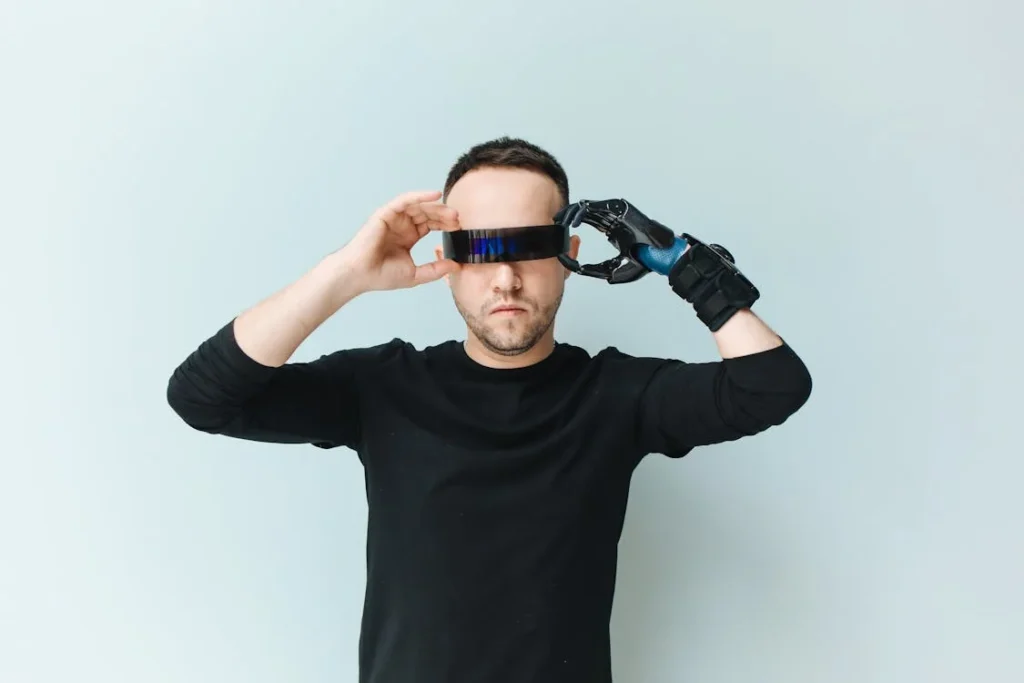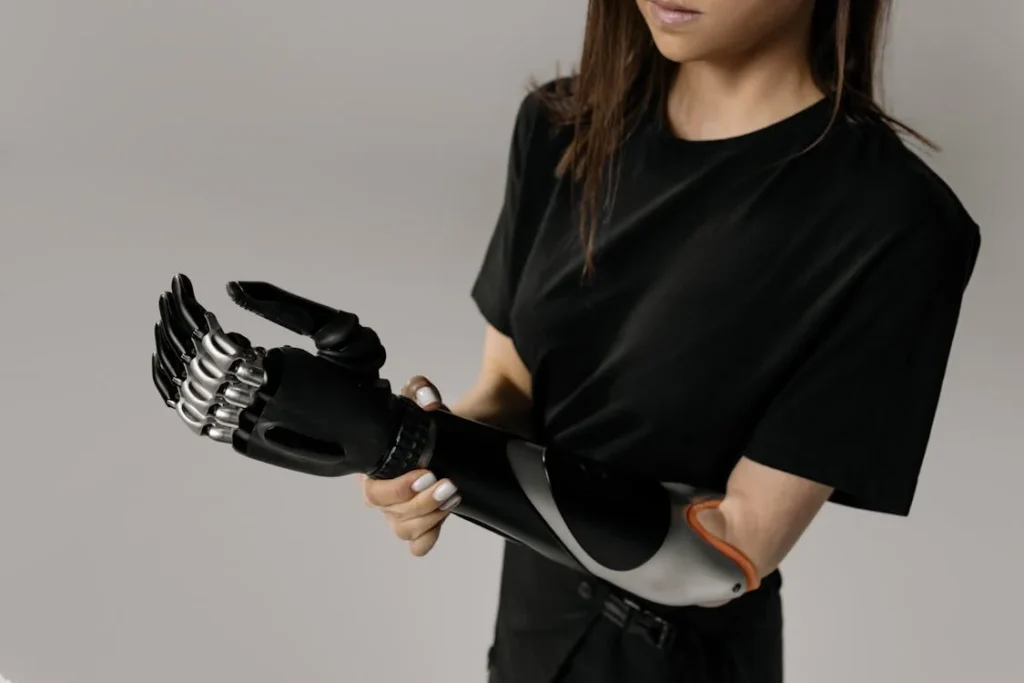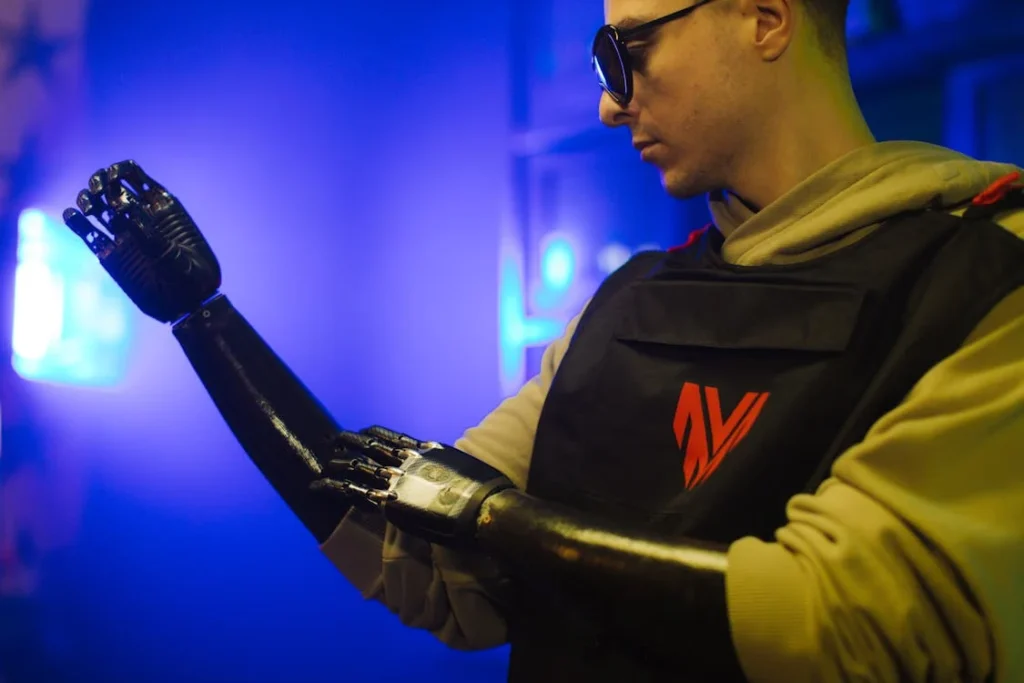In Dhanbad, where hard work is a way of life and people take pride in moving forward no matter the obstacle, the loss of a hand can feel like more than just a physical setback. It affects how you earn, how you move, and how you see yourself. Simple things like tying a shoelace, writing on a board, or even sharing a meal become difficult. But it doesn’t have to stay that way.
At Robobionics, we understand the emotional and practical challenges of limb loss. We’ve seen the pain, but we’ve also helped people rise above it — not with sympathy, but with the right support and the right technology. Our bionic hands are designed to bring back freedom, function, and confidence — all without the huge costs or complicated controls that many prosthetics come with.
If you live in Dhanbad and are looking for a real solution — not just a product, but a partner in recovery — you’re in the right place.

Why Dhanbad Needs a Reliable Bionic Hand Solution That Understands Local Life
The Daily Demands of Dhanbad
Dhanbad isn’t just a city; it’s a city built on effort. From coal mines to railway yards, from local shops to schools and hospitals, people here rely on their hands to build, fix, teach, serve, and support their families.
When you lose a hand, life doesn’t slow down — but it becomes harder to keep up. You still need to get to work. You still have chores at home. You still want to be seen as strong, capable, and self-reliant.
But what if every handshake feels awkward? What if writing your name, riding your bike, or holding your child brings more struggle than ease?
This is where Robobionics steps in. We know the weight that daily life carries in Dhanbad. Our goal is to lift some of that burden, quietly but powerfully, with a bionic hand that feels like your own.
We don’t believe that users in smaller cities should settle for less. You deserve the same cutting-edge technology as anyone else — without having to travel far, spend beyond your limits, or accept a device that barely works in your daily routine.
We’re here to make sure you don’t have to choose between function and affordability, or between comfort and durability. You get it all.
Imported Doesn’t Mean Ideal — Especially Not for India
A common myth is that foreign prosthetic hands are the best. They may come with sleek marketing videos and fancy features, but when it comes to using them in Dhanbad’s weather, work environments, and everyday challenges, they often fall short.
These imported hands are usually built for mild climates and controlled use. But here, where heat, sweat, dust, and constant activity are normal, these devices can feel fragile.
Their sensors may stop responding when humidity is high. Their battery life may not last a full workday. And if something breaks, repairs are slow, expensive, and frustrating.
Worse, these devices are often priced far beyond what most families in Dhanbad can afford. So people either avoid prosthetics entirely or settle for rigid plastic hands that barely open and close.
At Robobionics, we’ve turned this story around. Our prosthetic hands are built in India, for India. That means the materials are designed to survive our heat and dust. The parts are easy to clean.
The controls respond well to your muscle signals — even if you’ve been working all day or sweating in the sun. And best of all, our pricing is practical. You don’t have to sell your land or borrow money just to get back to normal.
Built Around You, Not Just for You
We never treat two users the same — because no two lives are the same. One person may need their prosthetic hand for driving an auto.
Another may need it to write on a classroom board. Someone else may need it to knead dough, lift heavy tools, or cradle a child’s head while feeding them. This is why we take the time to understand how you move, what you do, and what matters most to you.
Our bionic hands adapt to your lifestyle — not the other way around.
The fitting process isn’t rushed. We make sure the socket fits your arm perfectly, without pressure points or discomfort. We walk you through how to use the hand, step by step, without confusing terms or complex manuals.
And we offer support long after the first fitting. If something feels wrong after a month, we adjust it. If your needs change, we respond.
Many people in Dhanbad are used to working long hours. Whether in a shop, a school, a bank, or on a field, you don’t stop until the job is done. Our hands are made to keep up with you — not wear you down.
They’re lightweight, balanced, and responsive, so you don’t feel like you’re carrying a machine. Instead, you feel like you’ve got your own hand back.
Confidence Starts with Comfort
You can’t focus on using your hand properly if it hurts, slips, or makes you feel self-conscious. That’s why one of our biggest priorities is comfort — physical and emotional.
We design our sockets with soft, skin-friendly materials. We check for pressure points, air flow, and movement. If the hand feels too loose or too tight, we modify it.
If the material irritates your skin, we replace it. There’s no one-size-fits-all solution here, because your comfort is the foundation of your progress.
But comfort isn’t only physical.
We also make sure you’re confident in how the hand looks and behaves. Some people prefer a more natural-looking covering. Others want a sleeker, tech-style finish.
We let you decide. Because the right look matters. If you feel good wearing it, you’re more likely to use it every day — at work, at events, even during travel.
In Dhanbad, where public life is active and social circles are close-knit, it matters how you feel when you walk into a room. You deserve to feel whole again — not just in motion, but in presence. Our goal is not just to restore your grip, but to restore your self-image.

Local Problems Need Local Solutions – Why Robobionics Is the Right Fit for Dhanbad
Understanding the Realities of Access and Affordability
In cities like Dhanbad, many people live with challenges quietly. When it comes to healthcare, they often choose to delay or avoid treatment simply because the process feels complicated, expensive, or too far out of reach.
Getting a bionic hand is not just a financial decision — it’s an emotional and logistical one. Will it fit my daily routine? Can I afford it? If something goes wrong, where will I go? These are questions we hear every day, and our entire system is built to answer them honestly.
At Robobionics, we’ve eliminated unnecessary costs and focused only on what truly matters to the user. We manufacture our devices in India, with parts designed to be both durable and affordable.
This alone removes the burden of import taxes, long wait times, and expensive servicing. But we’ve gone further. We’ve simplified our pricing so that every user knows what they’re paying for — with no surprises.
People in Dhanbad deserve access to world-class prosthetics without having to leave their city or compromise their financial stability.
That’s why we also work with NGOs, local health groups, and rehabilitation centers to help users access funding, get fitted quickly, and receive training without needing to travel hundreds of kilometers.
For those who can’t make it to us, we come to them — through remote consultations and support visits.
Support Doesn’t End at the First Fitting
For most users, the first few weeks after getting a bionic hand are critical. It’s the time when you discover how it fits into your routine, how it reacts to your movements, and where you feel most confident — or most hesitant. Many other companies hand over the device and walk away. At Robobionics, we stay with you.
We’ve built a follow-up system that ensures every user in Dhanbad gets personalized attention. Our support team checks in with you to understand how the device is performing.
If you have trouble gripping a certain object, or if the battery doesn’t feel right, or if you simply want to ask a question, we’re just one call away. And you’re never just a number. We remember your case, your story, and your needs.
We’ve even created user guides in local languages. And instead of complicated technical manuals, we offer step-by-step support through WhatsApp, video calls, and printed visuals.
If your family needs to learn how to assist you, we teach them too. Because this isn’t just your journey. It’s a transition your entire household experiences together.
Your Hand Should Work Like You Do
Every region in India has its own pace of life. Dhanbad is active. People work early. They move quickly. Whether you’re in a government office, running a local business, or working in a mine or field, your day is full. You don’t have time to recharge a device every few hours or reset settings every morning.
We built our hands with that in mind. Our bionic hands have long battery life that lasts through the day. You can charge them overnight with a regular USB connection.
No bulky chargers. No special setups. And if you forget to charge one night, the hand still has backup power that gives you enough time to get through most of the next day.
Our technology also learns how you move. Over time, it adapts to the way your muscles send signals. The more you use it, the smoother it becomes.
So you don’t need to constantly think about controlling the hand — you simply begin to trust it. You focus on your task, not the tool. That’s the kind of quiet intelligence we believe in. It’s not flashy. But it makes your life easier every single day.
Working with Dhanbad’s Culture and Community
In Dhanbad, people don’t just live close to one another. They support one another. There’s a strong sense of community, and word travels fast — especially when someone is struggling or when someone finds a solution that really works.
That’s why many of our users come to us through someone they know. A neighbor. A cousin. A co-worker. Someone who got fitted, started using their hand, and began showing the results.
We don’t believe in selling through ads. We believe in showing real stories. If you’re unsure about what a Robobionics hand can do, we don’t ask you to trust a brochure.
We connect you with someone in your area who’s already using it. You can see the hand for yourself. Ask questions. Hear their experience. That kind of trust isn’t built overnight. It comes from being part of the community — not outside of it.
We also listen closely to feedback. In Dhanbad, we learned that many users work long shifts that require repeated gripping — tools, broom handles, bike handlebars. So we added adaptive grip response to make those motions less tiring.
We learned that power cuts are common in some areas. So we added a manual override feature to let the user open or close the hand even when the charge is low. These may seem like small things. But they change everything when you rely on the hand for daily life.
The Emotional Strength Behind Physical Recovery
Getting a prosthetic hand is not just about function. It’s about confidence. It’s about identity. It’s about walking out into your community without hiding your arm under a sleeve or avoiding eye contact.
For many people, the hardest part is not the surgery. It’s the shame. The sudden change in how people look at you. The feeling of not being whole anymore.
At Robobionics, we never ignore that. We speak openly about the emotional side of recovery. We include counseling support where needed. We train our staff to be kind and patient, especially during fittings. And we make sure our users know they’re not alone.
Your journey doesn’t have to be hidden. You don’t have to shrink into yourself. You can show up — at work, at weddings, at markets — not just as someone with a prosthetic, but as someone who stood up, made a choice, and took their life back.

Confidence in Public, Comfort at Home: A Hand That Truly Fits Your Life
Moving Freely Through Dhanbad’s Everyday Life
In a city like Dhanbad, every corner has a story. There are chai stalls buzzing with early morning customers, crowded bus stops during rush hours, coal yards where shifts start before sunrise, and parks where families gather in the evening.
The rhythm is constant, the movement is real, and social life is always within sight. For someone who has experienced limb loss, these public moments can become difficult. It’s not just about whether the hand works. It’s about whether you feel seen, accepted, and confident when people notice you using it.
That’s why we paid special attention to design — not just in how the hand functions, but in how it looks and how it feels in public. Our bionic hand doesn’t scream for attention, but it also doesn’t look like something to be hidden.
It sits naturally on your arm. It blends when you want it to. And it stands out when you choose to show it with pride.
Some of our users want a low-profile look that fits under a sleeve. Others want something modern and metallic that shows they’ve made a powerful comeback. You get to decide. We never push a style onto you, because we know that confidence grows from choice.
We’ve had users in Dhanbad return to coaching students, rejoin factory teams, and even take part in public speaking. Not because their prosthetic hand changed who they are — but because it helped them reclaim the space they felt pushed out of.
That’s what real recovery looks like. It’s not just being able to hold a pen or carry groceries. It’s being able to walk down a familiar street and smile when someone greets you.
Making Daily Tasks Simple Again
There’s something powerful about doing small things on your own. It’s not always about big accomplishments. Sometimes, it’s about peeling vegetables without needing help.
Locking your front gate. Buttoning your shirt without someone assisting you. Picking up your mobile when it rings. These are the moments where freedom lives — and these are the moments our users talk about most.
We’ve built the Robobionics hand to make those everyday actions easier. You don’t need to press buttons or switch modes constantly. Once you put the hand on, it begins reading your muscle signals.
As you practice, the hand begins responding more naturally. It understands when you want a light grip, like picking up a paper. It understands when you need a firmer hold, like lifting a bucket. And if you’re unsure at first, that’s okay — we train you until you’re ready.
The learning curve is gentle. You don’t need a tech background. You don’t even need to be literate. What you need is patience, and we’ll match that with support.
We’ve taught elderly users. We’ve taught children. We’ve taught people who’ve never touched a smartphone — and now use their bionic hand to unlock one.
This is not just about mechanical response. It’s about re-learning how to live without stress, without asking for help every time something small needs to be done.
For families in Dhanbad, this matters more than most realize. It allows people to be independent in homes where everyone is already juggling responsibilities. It brings dignity without needing attention. And that changes the energy of the entire household.
Fitting In With Dhanbad’s Pace, Not Slowing It Down
We’ve studied the daily lives of our users in Dhanbad — from early morning markets to late-night family dinners. We saw a common thread: people don’t stop moving.
Whether it’s someone working with tools, operating a rickshaw, helping kids with homework, or managing accounts at a family store, there’s a flow to the day. And a prosthetic that doesn’t keep up ends up forgotten in a drawer.
So we made sure our bionic hand could match that pace. It’s easy to wear and remove. It’s light enough to use for long hours without strain.
And it can hold its charge for a full day’s worth of activity. You don’t need a complex charging system or any special accessories. A basic plug point is all it takes.
And for people who work in rougher environments, like the mining or construction sectors, we’ve reinforced parts of the hand to take impact without breaking.
It doesn’t mind dust. It doesn’t freeze up if your palm is sweaty. And it doesn’t need delicate handling. That’s the difference between a medical tool and a life tool. We chose the latter — because our users don’t live gentle lives. They live real ones.
One of our users, a carpenter by trade, shared how he thought his working days were over. He had given up hope of returning to the workshop.
Today, not only is he back at work, he’s training an assistant — and the hand he wears is just part of the job now. It doesn’t define him. It just helps him do what he loves, on his terms.
Helping Families Heal Alongside the User
Limb loss doesn’t just impact the individual. It touches the entire family. The spouse who suddenly has to do more. The children who ask innocent questions.
The parents who worry in silence. Everyone carries a piece of the emotional weight. That’s why, when we begin a new fitting in Dhanbad, we often involve the entire family.
We explain the device to them. We show them how to help during the learning stage. We answer questions that people are often too shy to ask. Can I still hug someone properly? Can I hold a steel glass? Will people stare at me in a temple? Will my child be scared of it?
The answers matter. Because a prosthetic isn’t just for function. It’s a sign of recovery. And when the family understands that, they stop seeing it as a reminder of what was lost. They begin to see it as a symbol of what’s possible.
That shift changes how a home feels. It brings back lightness. It brings back routine. It brings back roles and responsibilities — not as burdens, but as choices.

From Recovery to Reinvention: Robobionics and the Future of Mobility in Dhanbad
Work, Identity, and the Drive to Return
For many in Dhanbad, work is more than a way to earn — it’s tied to identity. Whether you’re an office clerk, a tailor, a security guard, or a mother running her household, your hands are central to how you perform your role.
After limb loss, what hits hardest isn’t just the physical adjustment. It’s the sudden interruption of routine, of purpose. Days feel longer. Tasks feel heavier. And the mind often spirals with one question: Will I ever be the same again?
At Robobionics, we don’t believe in returning people to where they were. We believe in taking them forward — into something new, something stronger, something that makes them proud.
Our bionic hand isn’t just about restoration. It’s about reinvention. It helps users return to the workplace with functionality. But even more importantly, it helps them return with confidence.
We’ve seen men who thought they’d never be able to rejoin their tool-based jobs now operate wrenches, drills, or screwdrivers with the help of their prosthetic. We’ve seen teachers resume their posts, holding chalk and gesturing naturally during lessons.
We’ve seen homemakers go from needing help to lifting buckets, kneading dough, and caring for their children independently again. These aren’t dreams. They’re real outcomes — because when your prosthetic works with your routine, reintegration becomes not just possible, but natural.
And when that happens, identity returns. A man isn’t just a patient anymore. He’s a provider again. A mother doesn’t feel dependent. She feels strong. A student doesn’t feel behind. She feels capable. These shifts matter. They are the heart of why we do what we do.
Innovation Guided by Real Lives, Not Lab Theories
We’re proud of our technology. But we don’t worship it. For us, the goal isn’t to create something that looks futuristic or impresses engineers. It’s to build something that quietly transforms everyday life.
That’s why every feature of the Robobionics hand is inspired by real-life problems faced by users in cities like Dhanbad.
One feature that’s become incredibly valuable is pressure modulation. Many bionic hands on the market can open and close, but they don’t adapt to what you’re holding. That creates frustration. You try to pick up a fragile object and crush it.
Or you go to grab a cup and it slips. We solved this by creating a system that adjusts grip strength based on muscle intention. This means when you want to hold something lightly, like a paper or a biscuit, the hand reads that.
And when you want to carry something firm, like a bag or a handle, it responds accordingly. No toggling. No buttons. Just intuitive motion.
We also made sure the hand doesn’t depend on high-end connectivity or complicated apps. All tuning can be done directly through the hand itself, or with the help of our technicians.
You don’t need Wi-Fi, Bluetooth, or a smartphone. If you have those, great. But if you don’t, you still have full control.
Our users in Dhanbad told us early on — keep it simple, keep it strong, and make it last. That’s been our north star ever since.
You Don’t Have to Travel to Be Taken Seriously
One of the greatest frustrations we’ve seen among prosthetic users in Tier 2 cities like Dhanbad is the feeling that high-quality care is always far away.
Many people are told they need to go to Delhi, Mumbai, or Bangalore for proper fittings. That they should settle for basic devices locally or wait for visiting doctors to make an appearance.
We decided that wasn’t acceptable.
Robobionics set out to break that pattern. We trained prosthetists who live and work near your region. We equipped them with tools and parts that are available locally.
We created consultation protocols that allow for virtual fittings, virtual adjustments, and continuous communication — so the user doesn’t feel stranded after the sale.
Our follow-up teams speak your language. They understand your culture. They know that asking for help can be hard, so they check in proactively. And if a repair is needed, they work with local centers to get it resolved fast — often within a few days, not weeks.
This approach has made a major difference. Users in Dhanbad have told us they no longer feel like they’re chasing after care. Instead, care is part of the package.
Reliable. Present. Responsive. That’s how healthcare should be — not something you beg for, but something you receive with dignity.
The Long-Term Journey: Upgrades, Expansion, and Growth
One hand. That’s where the journey starts. But it doesn’t end there. As our users grow in confidence, their needs evolve. Maybe they want to learn advanced grip modes.
Maybe their profession changes. Maybe their body changes — weight fluctuations, muscle shifts, or lifestyle modifications.
We don’t disappear once the device is on your arm. We stay connected. And we plan for the future with you.
Robobionics is actively working on next-generation upgrades that won’t leave past users behind. That’s a big promise in this industry — and one we take seriously.
When we release new software, we make it available to existing users wherever possible. When a more efficient motor system becomes available, we look at retrofit options. Our hands are modular for a reason — so you can grow without starting over.
For users in Dhanbad, this means peace of mind. You don’t have to wonder if you’ll be forgotten after a year. You don’t have to worry about your device becoming outdated. You’re part of something ongoing — a relationship, not just a transaction.
We also provide group learning opportunities. From time to time, we host meetups, training sessions, and user panels — both in-person and online.
These are chances for users to share tips, stories, concerns, and breakthroughs. Sometimes, just seeing someone else succeed is all it takes to unlock a new level of confidence.
And when our users share their experiences, we listen carefully. Because while we may be the experts in bionic engineering, our users are the experts in living with it.
Every suggestion shapes how we improve. Every complaint gets taken seriously. And every thank you fuels our next innovation.

Prosthetics and Marriage: Navigating Personal Relationships After Limb Loss
Bringing Confidence Back into Intimacy and Family Life
Losing a limb doesn’t just affect how you work or move — it affects how you love, how you connect, and how you see yourself in a relationship.
In Dhanbad, where marriage and family are deeply rooted in tradition and community expectations, the pressure can be intense. Some people worry whether they will find a partner. Others, already married, quietly wonder whether their spouse still sees them the same way.
This emotional weight is very real. But it’s rarely spoken about.
At Robobionics, we’ve seen how prosthetics can quietly but powerfully restore not just function, but emotional closeness.
We’ve worked with individuals who once avoided marriage proposals, who began attending social functions again with confidence once they started using our bionic hand.
The shame that had settled into their body posture began to lift. They started making eye contact again. Laughing more. Engaging with people — not just because their hand worked better, but because they felt more complete in front of others.
The Quiet Impact on Existing Marriages
For those already married, limb loss can create an invisible distance. Not out of judgment, but out of helplessness. A spouse may want to help but not know how.
The person using the prosthetic may feel embarrassed while doing basic tasks like eating or changing clothes. Over time, this discomfort can grow into silence.
With our prosthetic fittings, we often invite spouses to join the sessions. Not just to help — but to understand. We teach them how the hand works.
We show them that it isn’t fragile. That it can take hugs, hand-holding, shared work in the kitchen, even play with the kids. We replace fear with confidence.
We’ve had couples tell us that they started sleeping better next to each other again. That small touches became easier, conversations lighter, connection stronger. These are not medical results — but they’re life-changing ones.
Reshaping Societal Expectations
In places like Dhanbad, where families are close-knit and community opinion matters, people facing limb loss often fear judgment. Questions about marriage prospects, fertility, and “normal life” start coming in from all directions. For some, it’s enough to stop trying.
Our work is about showing what’s possible — and making it visible. A user who returns to life with grace and confidence becomes an example for others.
We’ve seen users go on to marry, raise families, build homes, and live fully. And when their story spreads, it changes not just one life — but how society sees disability itself.

Children and Teenagers with Limb Loss: A Future Reimagined with Robobionics
Why Early Intervention Matters in a Growing Body and Mind
While many prosthetic companies design primarily for adults, we believe some of the most important transformations happen in childhood. In Dhanbad and similar cities, access to advanced prosthetics for children and teens is often overlooked.
When a child loses a hand — whether through birth difference, accident, or illness — it impacts more than just how they hold a pen or button a shirt. It shapes how they grow up, how they see themselves, and how the world treats them.
At Robobionics, we treat pediatric prosthetics not as a scaled-down version of an adult product, but as an entirely unique challenge. Children are still growing, their muscles are still developing, and their minds are still learning who they are.
A bionic hand at this stage is not just a tool — it’s a bridge to normalcy, learning, play, and social confidence.
We’ve worked with children who were afraid to go to school because they didn’t want to be teased. After just a few weeks of using our hand, they were back at their desks, holding pencils, answering questions, even helping friends.
That change doesn’t come from just technology — it comes from dignity restored.
Designing for Movement, Curiosity, and Play
Kids don’t sit still. They run, jump, climb, play, fall, and explore. That’s why a child’s prosthetic must do more than just grip. It must withstand rough use. It must feel light, look fun, and function without constant adult supervision.
We’ve built our pediatric designs to be simple to wear and remove, responsive to fast movements, and sturdy enough for outdoor life in a city like Dhanbad.
The goal isn’t to make the child focus on their prosthetic. It’s to help them forget they’re even wearing one. When that happens, they return to the rhythm of childhood — not as an exception, but as a participant.
We also work closely with schools. We help teachers understand the device. We answer classmates’ questions in a respectful, inclusive way. We help the entire environment adapt so the child isn’t isolated.
That’s how inclusion becomes real — not just by giving a child a hand, but by helping the world around them accept it with understanding and support.
Conclusion
In Dhanbad, where strength is measured by action and not words, Robobionics stands beside individuals who refuse to be defined by loss. Our bionic hands aren’t just devices — they are tools for renewal, crafted with care, built for real Indian lives, and supported with unmatched empathy. Whether you’re returning to work, rebuilding your confidence, starting a new chapter, or simply trying to lift a cup of tea without help, we are here to walk with you — every step, every adjustment, every triumph.
From children finding their rhythm at school to adults reclaiming their roles in family and society, our mission remains simple: to help you move forward, with dignity in your step and pride in your grip. If you’re in Dhanbad and searching for more than just a prosthetic — if you’re looking for a team that understands your journey — Robobionics is ready.
The future is in your hands again. Let’s shape it together.



